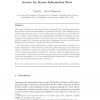Free Online Productivity Tools
i2Speak
i2Symbol
i2OCR
iTex2Img
iWeb2Print
iWeb2Shot
i2Type
iPdf2Split
iPdf2Merge
i2Bopomofo
i2Arabic
i2Style
i2Image
i2PDF
iLatex2Rtf
Sci2ools
103
click to vote
TCS
2010
2010
Arrows for secure information flow
This paper presents an embedded security sublanguage for enforcing informationflow policies in the standard Haskell programming language. The sublanguage provides useful information-flow control mechanisms including dynamic security lattices, run-time code privileges and declassification all without modifying the base language. This design avoids the redundant work of producing new languages, lowers the threshold for adopting security-typed languages, and also provides great flexibility and modularity for using security-policy frameworks. The embedded security sublanguage is designed using a standard combinator interface called arrows. Computations constructed in the sublanguage have static and explicit control-flow components, making it possible to implement information-flow control using static-analysis techniques at run time, while providing strong security guarantees. This paper presents a formal proof that our embedded sublanguage provides noninterference, a concrete Haskel...
Dynamic Security Lattices | Embedded Security Sublanguage | Security | TCS 2010 | Theoretical Computer Science |
Related Content
| Added | 30 Jan 2011 |
| Updated | 30 Jan 2011 |
| Type | Journal |
| Year | 2010 |
| Where | TCS |
| Authors | Peng Li, Steve Zdancewic |
Comments (0)

